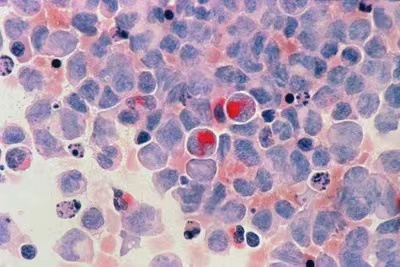创新价值
在英国,ALL每年影响约400名儿童,虽然大多数患者可以通过化疗和移植等标准治疗治愈,但在一些患者中,尽管进行了最大程度的治疗,但疾病还是会复发。CAR T细胞已经显示出复发性ALL的巨大希望 - 这是英国儿童癌症死亡的最常见原因。
创新过程
CARPALL试验由大奥蒙德街医院(GOSH)的Persis Amrolia教授和Sara Ghorashian博士以及UCL大奥蒙德街儿童健康研究所(UCL GOS ICH)领导,在复发性ALL的儿童和年轻人中测试了一种新的CAR T细胞疗法。

在CAR T疗法中,免疫细胞(T细胞)被设计成在其表面含有一种称为嵌合抗原受体(CAR)的分子,可以特异性识别癌细胞。在这种方法中,患者自身的T细胞被基因改造,以包含一种称为CAT-19的新型CAR分子,该分子由伦敦大学学院癌症研究所的Martin Pule博士实验室开发。
发表在《自然医学》杂志上的研究结果表明,在接受CAR T治疗后,14名原本无法治愈的急性淋巴细胞白血病患者中有12名在三个月后清除了他们的疾病,五名患者仍然没有白血病。患者也经历了较少的有害副作用,称为细胞因子释放综合征(CRS)。

在研究中,实验室实验表明,与其他CAR T疗法相比,CAT-19 CAR-T细胞在遇到白血病细胞后能够生长得更好。在患者中,大量的CAT-19 CAR T细胞在癌症被清除后仍然存在于血液中,使身体即使在治疗多年后也能继续与白血病作斗争。
接受CAR-T治疗的患者经常经历CRS,因为免疫系统变得过度活跃,试图对抗癌细胞。它可能导致患者被送入重症监护室,并可能导致死亡。为了避免这种情况,CARPALL试验中使用的CAR T疗法被设计成使其与其他类似疗法相比更快地与癌细胞表面的靶标相互作用。这意味着虽然CAR T细胞仍然可以有效地杀死白血病细胞,但这些细胞引起的免疫系统激活较少,因此危险的副作用较少。没有接受新疗法的患者出现严重的CRS,这表明这种疗法比其他CAR T细胞疗法更安全,尽管这需要在更大的研究中得到证实。
创新价值
新型CAR T细胞疗法,旨在更快地靶向癌细胞并引起更少的副作用,对于以前无法治愈的急性淋巴细胞白血病(ALL)的儿童来说,已经显示出非常有希望的结果。
创新关键点
在CAR T疗法中,免疫细胞(T细胞)被设计成在其表面含有一种称为嵌合抗原受体(CAR)的分子,可以特异性识别癌细胞。
创新主体
伦敦大学学院(University College London,简称:UCL ),1826年创立于英国伦敦,是一所公立研究型大学,为伦敦大学联盟的创校学院、罗素大学集团和欧洲研究型大学联盟创始成员,被誉为金三角名校和“G5超级精英大学”之一。
UCL是伦敦的第一所大学,以其多元的学科设置著称,于REF 2014 英国大学官方排名中,位列全英之冠,享有最多的科研经费。UCL的医学、解剖学和生理学、建筑学、教育学、考古学、计算机科学、计算金融学等学科排名均位居世界前列,与LSE并称为“英国现代经济学研究的双子星”;其人文学院颁发的奥威尔奖则是政治写作界的最高荣誉。
Innovative CAR T-cell therapy for leukemia
The CARPALL trial was led by Professor Persis Amrolia and Dr Sara Ghorashian at Great Ormond Street Hospital (GOSH) and UCL Great Ormond Street Institute of Child Health (UCL GOS ICH), A new CAR T-cell therapy was tested in children and young adults with recurrent ALL.
In CAR T therapy, immune cells (T cells) are designed to contain a molecule called chimeric antigen receptor (CAR) on their surface that specifically recognizes cancer cells. In this approach, a patient's own T cells are genetically engineered to contain a novel CAR molecule called CAT-19, developed in the laboratory of Dr Martin Pule at the UCL Cancer Institute.
The findings, published in the journal Nature Medicine, showed that after CAR T treatment, 12 of 14 patients with otherwise incurable acute lymphoblastic leukemia cleared their disease three months later and five remained leukemia-free. Patients also experienced fewer harmful side effects, called cytokine release syndrome (CRS).
In the study, laboratory experiments showed that CAT-19 CAR-T cells were able to grow better after encountering leukemia cells compared with other CAR T therapies. In patients, large numbers of CAT-19 CAR T cells remain in the blood after the cancer has been cleared, allowing the body to continue to fight leukemia even years after treatment.
Patients receiving CAR-T often experience CRS as the immune system becomes hyperactive in an attempt to fight cancer cells. It can result in the patient being admitted to the intensive care unit and can lead to death. To avoid this, the CAR T therapy used in the CARPALL trial was designed to interact with targets on the surface of cancer cells more quickly than other similar therapies. This means that while CAR T cells can still effectively kill leukemia cells, these cells cause less immune system activation and therefore fewer dangerous side effects. Patients who did not receive the new therapy developed severe CRS, suggesting that this therapy is safer than other CAR T-cell therapies, although this needs to be confirmed in larger studies.
智能推荐
利用活性多肽治疗缺血性脑卒中
2022-07-02从山蛭中提取多肽,追本溯源反向利用活性多肽治疗缺血性脑卒中。
涉及学科涉及领域研究方向肿瘤学创新 | 新型磁疗法可增强乳腺癌的治疗效果
2022-09-30开创新型磁疗法增强对乳腺癌的治疗作用,优化磁性方案,更有效地杀死癌细胞,从而推动癌症治疗发展。
涉及学科涉及领域研究方向AI+临床医学 | 利用人工智能检测剖腹产伤口感染情况
2022-09-21该项目将人工智能与临床医学相结合,创新开发了一个移动健康平台。该平台利用人工智能和实时计算机视觉来预测产妇剖腹产伤口的感染情况,并使用热成像技术解决了算法偏差,使得预测的准确率高达90%。
涉及学科涉及领域研究方向心血管病学创新 | 创新利用新型基因编辑疗法可有效治疗心力衰竭
2022-11-09根据UCL领导的一项试验的早期结果,对患有导致心力衰竭的疾病的人的首创基因编辑疗法在短期内是安全的,并可能阻止疾病进展。
涉及学科涉及领域研究方向